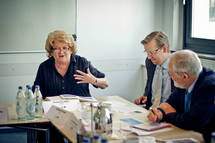Creative Clusters

European experts gathered in Stuttgart to explore and identify critical factors for Creative Clusters in relation with Cultural Heritage, on a workshop promoted within the CreativeCH Project by MFG Baden-Württemberg on 18 April 2012.
Participants from 10 European regions and across disciplines could agree that there are still some difficulties in setting up clusters in cultural heritage, especially when it is supposed to foster regular and effective cooperation among cultural heritage institutions, cultural & creative businesses, and science & technology centres.
Despite it was considered that the process might take some time and investments on bringing this partners together and make they understand each other, the need from the creative industries is already there, as highlighted Anamaria Wills from CIDAco: “Shared knowledge and shared experiences are especially important for creative people, who are sometimes too much concentrated on their own work and ideas. The effective creative clusters are the ones where you share”.
Anamaria Wills and her company CIDAco have already experience on bringing inspiring approaches to academic research projects, like the work done with the University of Leeds Arts and Humanities researchers. “It is a slow process and it needs that both the creative and the academic people come together and exchange their views and perspectives to find innovative ideas and solutions”, explained Wills.
“This cooperation is crucial, because the Cultural Heritage experts can bring content and the technology and creative can bring the form”, added Valentina Montalto, KEA political advisor. The expert is preparing a study on the impact of structural funds on Cultural Industries and reinforces that clustering is a need. Beyond that, KEA is also an initiator of the KIICS project, an EU funded initiative that will research on the benefits of promoting the cooperation between arts, science and technology.
From the experience of the European Interest Group on Creativity, a European network that has a bottom-up approach, Valentina Grillea, EICI Project Manager, believes that trust is among one of the most important elements. “Trusting each other means that it is going to be easier to learn from each other”, explained the specialist, adding that the perspective of having this on the spotlight, made it possible for EICI to become a community: “The fact that EICI considers collaboration, trust and relationship as its core values, makes it possible for us to be more than a network. EICI reached a further step by becoming a true community, able to cover all the fields of creativity throughout its connections“.
The experience economy examples and the cross-sectorial cooperation advantages were showcased with the Portuguese network “RUCI” (Urban networks for Competitiveness and Innovation) by Joaquim de Carvalho. The Coimbra University Professor has been striving to make this network an example of how the cultural content available benefits from the application of the latest technologies and how both sides benefit from this cooperation.
The project “RUCI” has its focus on the cooperation between small Portuguese municipalities in order to promote regional development. Within this framework, in some events there have been experiments on how creativity can be stimulated throughout the whole education circle.
Despite the motivating outcomes, the current social and economic circumstances are becoming a threat to the stability of those networks and clusters. “We know that all the initiatives within RUCI can be anytime endangered by a cut of funding and maybe this is our next big challenge”, concluded Carvalho.
The workshop counted also with the participation of Hanna Kasper from Iconoval, a French organisation working on technologies in cultural tourism in Strasbourg; and Christoph Runde from the Virtual Dimension Center in Stuttgart, that has been involved in successful pilot projects for landscape 3D modelling.
“There is a competition up globally in creative products and services in which Europe cannot afford to fail”, said Guntram Geser from Salzburg Research, that moderated the workshop, explaining that it was clear from the discussion and interventions that “the cultural heritage institutions must get out of their comfort zone, work in new ways and with unfamiliar partners”.
Text: Chiara Ficano and Evandro Oliveira. MFG
Experts Perspectives
CidaCo
Workshop Fotos
FULL WORKSHOP REPORT
Videos
Videos of this and other workshops you can find here
Download Presentations



